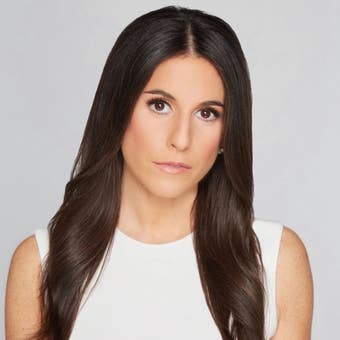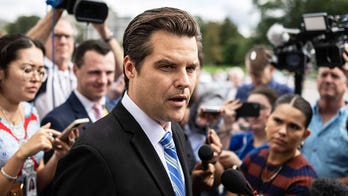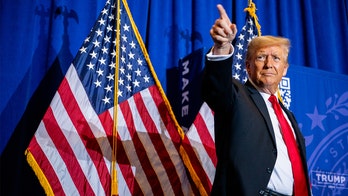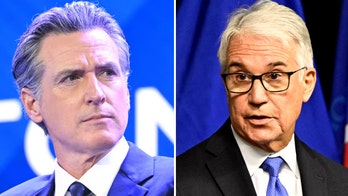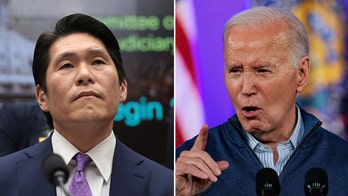CDC issues sweeping mask mandate for travelers
Jonathan Serrie tells you what you need to know about the new federal mask mandate.
President Biden is expected to travel to Delaware this weekend, in what will be his first out-of-town trip since taking office, despite warnings from the Centers of Disease Control and Prevention to avoid travel.
The CDC’s guidance this week said that "travel increases your chance of spreading and getting COVID-19," and recommended "that you do not travel at this time."
Biden, who has a home outside Wilmington, Delaware, is expected to fly on Air Force One and will avoid much of the travel risks associated with commercial flights or traveling on other methods of public transportation like bus or train.
The CDC is also recommending that those who must travel first complete their vaccinations, if they are eligible to receive them, and then wait two weeks after the second dose before departing.
The president, who is 78 years old, has also received both doses of the coronavirus vaccine, and received the second dose of the vaccine three weeks ago.
Former President Trump made multiple trips to his Mar-a-Lago resort in Palm Beach, Fla. amid the pandemic last year.
White House press secretary Jen Psaki on Friday was asked why the president was traveling to Delaware amid the CDC advisory, and she reminded reporters that Air Force One is a "private plane."
"He’s from Delaware and has a home there and is going to spend the weekend with his wife and family there," Psaki said.
The first weeks of Biden’s administration have been focused on getting a handle of the coronavirus pandemic, with the president signing a number of COVID-19-related executive orders and the White House Coronavirus Task Force holding multiple briefings a week.
Biden, on his first day in office, vowed to administer 100 million vaccines within his first 100 days in office— a goal his coronavirus advisers say he is "on track" to meet.
Biden and his aides have been meticulous about how they go about their business as they try to reduce chances of infection among White House staffers. Mask wearing is mandatory throughout the White House complex, much of the administration is working remotely, and the duration and size of meetings has been limited.
Biden also has made few appearances outside the White House complex during the first weeks of his presidency -- all for official business or to attend church.
Meanwhile, the CDC this week ordered that all arriving and traveling across the U.S. must wear masks, as well as at transportation hubs, meaning "any airport, bus terminal, marina, seaport or other port, subway station, terminal, train station, U.S. port of entry, or any other location that provides transportation."
"America’s transportation systems are essential," CDC Director Dr. Rochelle Walensky, said in an earlier statement. "Given how interconnected most transportation systems are across our nation and the world, when infected persons travel on public conveyances without wearing a mask and with others who are not wearing masks, the risk of interstate and international transmission can grow quickly."
Enforcement of the order is seemingly up to transit operators; "conveyance operators must use best efforts to ensure that any person on the conveyance wears a mask when boarding, disembarking, and for the duration of travel," the order reads.
A small footnote notes that the "CDC reserves the right to enforce through criminal penalties [but] CDC does not intend to rely primarily on these criminal penalties but instead strongly encourages and anticipates widespread voluntary compliance."
The CDC, though, urges against non-essential travel amid the pandemic.
"CDC recommends that non-essential travel be avoided; however, for those who must travel, additional measures are being put in place to help prevent the spread of the virus," Walensky added. "Masks are most likely to reduce the spread of COVID-19 when they are widely and consistently used by all people in public settings."
As for vaccines, White House Coronavirus Task Force Director Jeffrey Zients, during a COVID-19 briefing on Wednesday, said the administration is "encouraged" by the progress to increase vaccine supply and is continuing "to push for every opportunity to do more."
"We are at war with this virus. It is clearly a national emergency," Zients said. "And we are doing all we can."
CDC ORDERS FACE MASKS FOR TRAVELERS
"This will not be easy," Zients said. "Vaccinating everyone in America is one of the greatest operational challenges we have ever faced and we will not stop working until this mission is complete."
Zients outlined a number of steps the Biden administration has taken in its first two weeks in office, including the government’s purchase of an additional 200 million doses of vaccine — a move officials hope can have most Americans vaccinated by the end of the summer.
"We are on track to meet the president’s goal of 100 million shots in 100 days," Zients said, noting that, on average, 1.3 million vaccines have been administered per day since Biden took office.
Zients also announced Wednesday that the Biden administration has engaged an "all-of-government effort" to provide Americans with "access to more places to get vaccinated" and establish community vaccination centers across the country.
Fox News' Kayla Rivas and The Associated Press contributed to this report.
